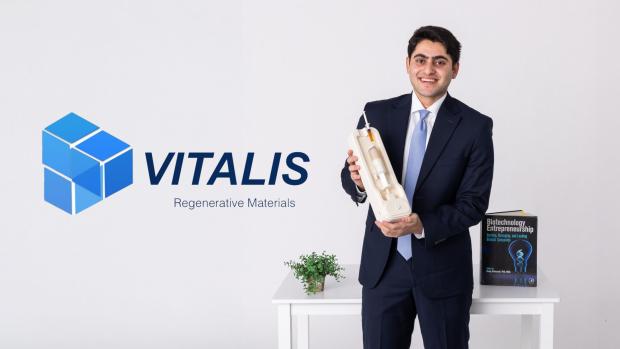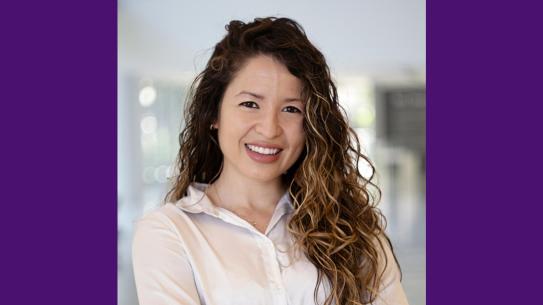Asser El Ashwah is a molecular architect building new biomaterials, a new way to heal, and a new company

Stories of young entrepreneurs who have launched highly successful startup companies while still students have become part of NYU lore: Rick Rubin, who founded Def-Jam Records from his Washington Square dorm, for example, or Joe Landolina, who as a first-year student living in Othmer Hall formulated a new product — now FDA approved — that halts bleeding almost instantaneously.
Asser El Ashwah, an NYU Tandon junior studying biomolecular science, appears poised to enter their ranks with his company, Vitalis, which aims to enhance healing, reduce complications, and improve outcomes in the surgical repair of tendon injuries.
El Ashwah, who was raised in Egypt, hails from a family of medical practitioners and STEM professionals. (His grandfather and three uncles are all doctors, and his father is an oral and maxillofacial surgeon; his mother is a professor of computer engineering.) While medical school remains a future option for him — he is part of Tandon’s Pre-Health Program — he realized early on that he did not want to only study medicine: he also wanted to build something concrete. “I’ve always been very visual and hands-on,” he explains. “I love painting and woodworking, and back in high school I built and designed a bunch of fun ideas.”
That combination of passions made studying biomolecular science a natural choice: perhaps, he reasoned, he could one day create a tool that surgeons could use in the operating room, and when he began thinking about the potential of natural polymers and design application to be tailored for medical applications in a new way, the idea for Vitalis was born.
While the idea — a natural way to amplify the healing process where it is most needed — came intuitively, executing it successfully has been a long and challenging journey. His goal was simple: to give patients a “biological nudge” that promotes healing. But bringing that vision to life has required constant building, testing, learning, and reaching out to anyone who might help make it a reality. “It’s not always easy,” he admits, “but it’s worth it — because I believe in it, and I know there’s a better way to heal.”
El Ashwah took every course in tissue engineering, natural polymers, and stem cells he could manage, including some at a graduate level, and he explored the possibilities of commercializing his discoveries during an entrepreneurship class with Industry Associate Professor David Lefer, who became an important mentor. (In addition to Lefer, he credits Vadim Gordin, NYU Tandon’s Acceleration and Incubation Coordinator and Director of the NYU Tandon Future Labs A/X Venture Studio, and Industry Associate Professor of Chemical and Biomolecular Engineering Richard Stein, whose course on stem cells that introduced El Ashwah to regenerative medicine, for guiding him.)
Following Lefer’s class, El Ashwah became deeply immersed in NYU’s entrepreneurial ecosystem, and at both the 2025 NYU Entrepreneurs Challenge and Tandon’s annual InnoVention competition, he easily won the “audience choice” award. He also recently garnered the YOPE x NYU Founder Award for exceptionally promising work at the intersection of science and social impact. (The award celebrates a student founder whose journey exemplifies resilience, resourcefulness, humility, and drive, and it comes with $100,000 in funding.)
Judges have been impressed by El Ashwah’s innovative use of advanced biomaterial formulations in combination with autologous concentrates, which can be deployed right at the point of care in the OR and which, unlike other plasma treatments, offers the sustained release of growth factors. Now, with those high-profile competition wins behind him, he is at the stage of running small-scale trials to validate efficacy and networking with surgeons for potential pilot programs.
It’s an exciting time, but El Ashwah remains clear-headed about the work ahead, especially since as a solo founder, every aspect of the business rests upon his shoulders — and that’s in addition to the demands of his summer position (doing stem-cell research at Langone) and his upcoming senior-year studies (which he hopes will include more graduate-level courses).
“I think biosurgery is increasingly going to be used in the future,” he says. “The idea to augment and promote tissue repair will be a benchmark standard of care and already is in some ways, and I hope I can play a role in that.”




